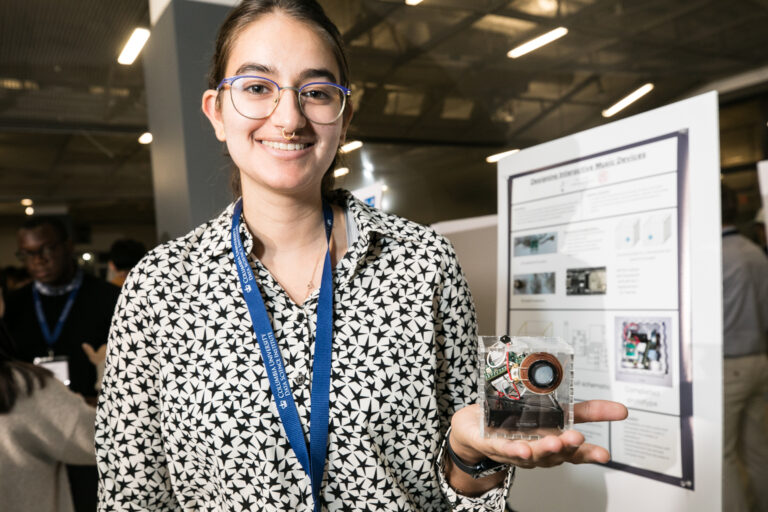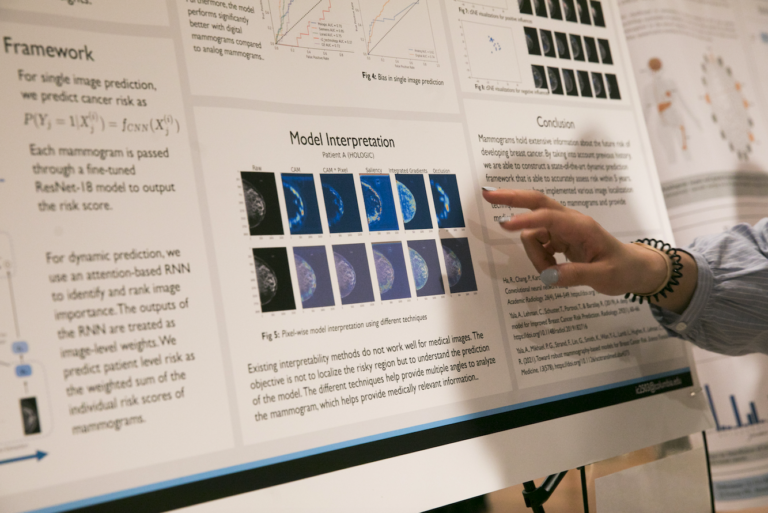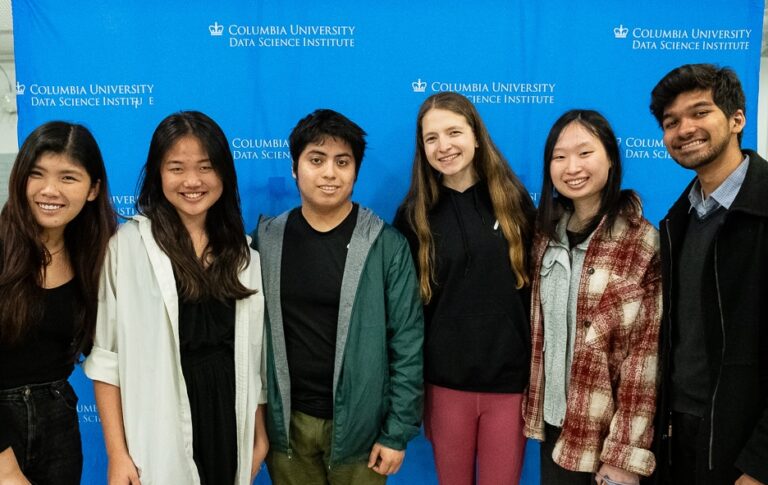Exhibit
Undergraduate students can now apply to exhibit their work. See application details below.

Student Application Deadline: Wednesday, October 22 (11:59 PM ET)
Event Date: Thursday, November 6 (5:00 PM – 7:30 PM) | Mudd Building, 4th Floor | Carleton Commons & 407 Suite
Over the past three years, AI has rapidly moved into classrooms, workplaces, and everyday life. Yet beyond the hype lies a deeper question: what kind of future do we want to build? As AI technologies become mainstream, we collectively face opportunities, responsibilities, and risks.
This year’s theme invites students to look past short-term novelty and consider how AI might create lasting impact over the next 10 years. Projects may explore both the potential and the limitations of AI across technological, social, and ethical dimensions. The fair offers students a space to imagine possible futures and new processes, whether they are optimistic, cautious, or reflective. Students can consider the following prompts as starting points to guide and inspire their submissions:
| If you could design one new AI application to truly improve human life by 2035, what would it be? | What does a positive future with AI look like? Who benefits from AI, and who is left out? | It’s 2035. Will AI be heavily legislated, or a free-for-all? What future do you want to see? |
| Could AI become a creative partner or even a friend? And what responsibilities would come with that? | How do we weigh the environmental and social costs of AI against its potential benefits? | How will AI reshape the skills needed for the next generation of students, workers, and leaders? |
| How can we build systems that are transparent, fair, and resilient against misuse? | What are the limits of automation? Where do we still need human judgment, creativity, and oversight? | How can we move beyond today’s AI hype to build tools and practices that last for the next decade of growth? |
Hosted by: Data, Media and Society Center at the Data Science Institute, Columbia University
Co-Sponsors: Department of Statistics, Graduate School of Arts and Sciences, Columbia University; Department of Computer Science, Columbia Engineering; Department of Computer Science, Barnard College; Vagelos Computational Science Center, Barnard College
Organizing Committee: Ann Chengying Li, Junior, Columbia Engineering; Alexa Kafka, Junior, Barnard College; Christine Li, Junior, Columbia Engineering; Daniel Alejandro Manjarrez, Junior, Columbia Engineering; Rebecca Frey, Junior, Barnard College; Rayhana Mouaouia, Barnard College; Riley Stacy, Junior, Barnard College; Isik Aysel Kiymac, Sophmore, Barnard College; Linda Mukarakate, Senior, Columbia College
In their exhibitor applications, students will select which of the following three thematic tracks is the best fit for their work. Students are welcome to submit projects that extend beyond these tracks, including current works in progress.

AI in Society: Human Futures: How AI is reshaping work, culture, politics, and everyday life. Projects may examine its effects on jobs and education, questions of trust and misinformation, or broader issues of ethics, access, and regulation. Students can also imagine speculative futures, considering how AI might evolve beyond current applications.

Responsible and Sustainable AI: Exploring the risks and responsibilities of scaling AI systems. Projects may address environmental impacts, security and privacy challenges, or issues of transparency and governance, with an eye toward best practices and safeguards that can guide AI’s responsible growth.

AI for Discovery and Innovation: How AI expands knowledge and sparks new ideas. Projects may explore research and scientific discovery, applications in fields such as health, climate, or finance, or creative prototypes that imagine the next generation of AI use cases. Students might also focus on advancing the technology itself, including developing more efficient and accurate AI models.
Undergraduate students can now apply to exhibit their work. See application details below.

Join 100+ attendees to learn about new and novel research from the undergraduate community.

Your support will help make the fair a reality for our undergraduates. Contact datascience@columbia.edu to explore sponsorships.

Submit your application via the application form.
The application is open to all currently enrolled undergraduate students at Columbia and Barnard, regardless of major or discipline. Students may submit projects developed for classes, but it is not required. Independent projects, not tied to any coursework or faculty oversight, are also welcome.
When filling out the application, you will be asked to choose the thematic track that best matches your research. This selection may influence where your project will be displayed at the fair. Students are welcome to submit projects that extend beyond these tracks, including current works in progress. The three tracks are:
AI in Society: Human Futures – Exploring how AI will transform work, culture, politics, and everyday life
Responsible and Sustainable AI – Focusing on the costs, risks, and responsibilities of scaling AI systems
AI for Discovery and Innovation – Where data science and AI expands the boundaries of knowledge and practice
A variety of presentation formats will be considered for the fair. On the application form, please select one of the following formats to help organizers allocate the best exhibitor space for your work.
Research Posters: Posters should fit on an easel. Foam boards in sizes 20×30 and 30×40 inches, along with easels, will be provided. If you require a different size, please bring your own foam board. Thumbtacks will be available. You may use the DSI poster template to format your poster.
Table-Based Demonstrations and Visualization Projects: This category includes digital projects displayed on a laptop or monitor, such as data visualizations, coding projects in action, or robotics demonstrations. A standard table and power outlet will be provided. Please bring your own laptop or monitor. You may also bring additional printed materials or small installations that fit on a standard table.
Startup and Entrepreneurial Projects: Startups may showcase a live demo of their technology (on a laptop or phone), a slide presentation about the company, or a physical product. A standard table and power outlet will be provided. Bring printed materials that highlight your company’s mission and brand.
Creative Tech, VR/AR Installations, or Performances: This category is open to a wide range of interpretations. We will work with you to find the best space for your project at the fair. Examples include VR/AR experiences, video games, installation art using data, sound experiments, and more.
At the fair, faculty judges will review and select four prize winners, including best overall project and best project in each of the three tracks. Projects will be judged on criteria including technical depth, creativity, and possible benefits to society. More information will be shared about prizes before the event.
If you have any questions about the fair or the application process, the fair organizing committee will meet at the below times:
Location: Northwest Corner Building, 14th Floor – Ask for Alexis Avedisian, Director of Events and Marketing